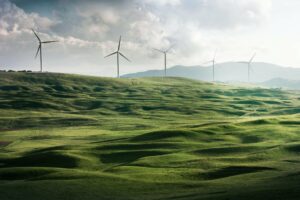Sustainability is becoming increasingly visible in all areas of our lives, from investors such as Larry Fink at Blackrock stating that they’ll sell shares in the worst corporate polluters in a bid to support the goal of net-zero carbon dioxide emissions by 2050[1] to the uproar against the practices of many fast fashion brands.
But what does sustainability mean, and why is it important?
Often misunderstood, sustainability is regularly considered to only refer to energy sustainability and reducing carbon emissions.
However, sustainability is more than just a buzzword and it’s more than just environmentalism.
While protection of the environment is part of sustainability, that’s not where sustainability ends. The concept of sustainability also covers economic development and social equity.
Adopting sustainable practices, large and small, has the potential to make a huge impact on the environment, society, and the economy. The end goal is a world where every human has access to basic resources, we use resources at a manageable rate, so as not to run out of them, and maintain economic development. Over the years, this idea of sustainability has been referred to as ‘People, Profit, Planet’, or the ‘Triple Bottom Line’ emphasizing the fact that all three types of sustainability are important.
Read the other posts in our sustainability series:
Sustainable fashion
Sustainable agriculture
Sustainable fishing
In this sustainability series, we’ll be looking into sustainability across different industries, exploring supply chains and discussing how sustainability has the potential to benefit everyone.
First, we’re taking a look into what sustainability is and why sustainability is important.
Defining Sustainability – What is Sustainability?
If you’re wondering “what does sustainability mean?”, you’re not the only one. As discussed above, many people only consider the environmental aspects of sustainability and neglect the social and economic aspects.
While the idea of sustainability is not new, there have been, and continue to be, many definitions and ideas on sustainability and sustainable development.
The Brundtland definition of sustainability which arose from the World Commission on Environment and Development (WCED), 1987 is a sustainability definition that’s widely accepted.
The Brundtland Commission’s definition for sustainability puts the meaning of sustainable development and sustainability, as “development that meets the needs of the present without compromising the ability of future generations to meet their own needs.[2]”
This means thinking about the kind of future we’re leaving for the next generation and ensuring that the way we’re living now can be continued in the future.
The three pillars of sustainability
The three pillars of sustainability (or principles of sustainability); society, economy, environment are explored in more detail below and help explain the idea of sustainable living.
Social sustainability
Social sustainability is what many people think of when they think of “sustainable development”. This pillar of sustainability refers to ensuring that everyone has access to necessities such as clean, water, adequate food, healthcare, shelter, and human rights.
Social sustainability also means making sure that workers aren’t exploited or discriminated against. These aspects play a big role in sustainable supply chains where workers are sometimes mistreated in a company’s effort to maximize their profit.
Economic sustainability
If the other two principles of sustainability are familiar, this third one may not be. Economic sustainability, it as important as the others, but is often the one that sparks the most debate.
While economic sustainability is built into the UN goals, some believe that sustainability comes at the expense of the economy and jobs.
However, the definition of economic sustainability is “practices that support long-term economic growth without negatively impacting social, environmental and cultural aspects of the community.[3]” This goes to show that economic growth is built into sustainability and isn’t against it.
It’s not just about economic performance today, but the ability for future generations to perform well economically too and that can’t be achieved if sustainability overall is lacking.
Furthermore, recent studies have shown that it is possible to grow the economy while simultaneously reducing carbon emissions. In California, the state has grown its GDP by almost 60% while reducing its emissions to keep them below 1990 levels all while seeing a growth in population. The U.K. has also reduced emissions by 29% over the past decade while growing its economy by 20%.
Environmental sustainability
The aspect of sustainability that most people are familiar with, environmental sustainability, means making sure we don’t overuse natural resources to the point where we run out of them or destroy the environment. Put another way, it’s about the sustainable management of natural resources.
Most would agree that the way we currently use natural resources is not sustainable. Changes in this area would help protect global ecosystems and biodiversity, help ensure clean water and air and reduce our greenhouse gas emissions.
The UN’s Sustainable Development Goals (UN SDGs)
The UN SDGs break down the above three pillars of sustainability into 17 sustainability goals (SDG 17).[4] The current goals were agreed on in 2015 with the aim of meeting each goal by 2030.
These goals cover the social, economic, and environmental aspects of sustainability, further demonstrating that sustainability isn’t only about the environment.

Why is sustainability important?
Our current lifestyles, particularly those enjoyed by most in Canada, cannot be sustained forever.
There’s a limit to the number of resources we can extract and the products we can consume before it has an impact on our quality of life and on the Earth itself.
We’re already seeing the effects of not living sustainably. People are experiencing water shortages or poor water quality, once fertile land can no longer grow food[5] without mass fertilization which runs off the land and contributes further to poor water quality, and we’re experiencing more extreme weather conditions leading to flooding, droughts and other weather events in increasing numbers across the world.
Incorporating sustainability into every aspect of life means working to reduce these damaging effects; something everyone stands to benefit from.
Examples of Sustainability in Action
Sustainable actions can be big or small. At home, you may start reusing plastic containers or buying fewer plastic items all together to reduce your consumption of this hard to recycle material.
Businesses may introduce energy-efficient appliances into their workplace, ensure lights and devices are switched off while manufacturers are looking into how to reduce their waste and energy consumption whether through the production processes or by creating eco-friendly packaging. This is leading to sustainable innovations and many sustainable technologies have been created as people work together to create green initiatives.
There’s also a growing call from consumers and governments to make sure that workers are being paid a fair wage and have good working conditions, both of which are sustainable actions.
Fashion sustainability, sustainability in agriculture and the concept of green buildings are just some industries where there is huge room for improvement.
On a larger scale, sustainability initiatives such as the Rainforest Alliance and Fair Trade encourage environmentally-friendly farming practices while also ensuring farmers receive a decent living wage.
Throughout this series, we’ll be taking a look at some industries in more detail, exploring the new sustainability initiatives that they’re taking and innovative technologies that have been created as we work together to create a more sustainable future for the next generations.




